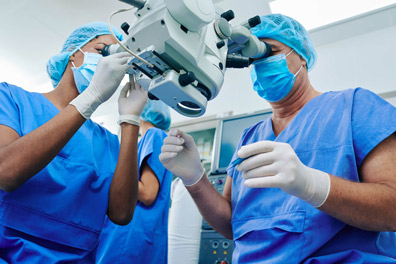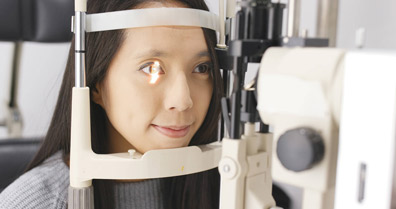Cornea Transplants in Denver, CO
Cornea transplants are life-changing operations with the potential to save or restore your vision when no other treatment can. Issues like your cornea being an irregular shape can be corrected with eyewear, such as glasses and contacts, or laser eye surgeries, like LASIK. Other problems, including injuries and diseases, may permanently damage the cornea, causing pain or rendering it unable to do its job. In these cases, a cornea transplant may be needed. Our board certified, fellowship-trained eye surgeon, Dr. Gregory Kouyoumdjian (known around the office and by patients as Dr. K), has performed hundreds of successful cornea transplants for patients. While these procedures are less common than LASIK or cataract surgery, this outpatient surgery can restore your vision, resolve painful conditions, improve the eye’s appearance, and provide a higher quality of life.
Here’s everything you need to know about this procedure, including how Dr. K and the team at The Denver Ophthalmology Center can make the process of your cornea transplant comfortable and stress-free.

What Is A Cornea Transplant?
- Outer (or epithelial) layer. This layer needs to be smooth for good vision. This layer is damaged if you have a scratched cornea (corneal abrasion).
- Middle (or stromal) layer. This layer makes up most of the thickness (about 90%) of your cornea. Damage to the cornea or corneal swelling that lasts a long time can cause scarring in this layer.
- Inner (or endothelial) layer. This layer has thousands of pump cells pushing fluid out of the cornea, helping to keep it clear. Cells in this layer can be damaged by age, injury, inflammation (when the layer becomes red, swollen, and hot), other eye surgery, or a disorder such as Fuchs’ corneal dystrophy. These and other problems can cause poor vision if the cornea gets swollen and cloudy. You may need a corneal transplant if taking medicine does not help enough.
Why Would Someone Need A Cornea Transplant?
The most common reason you may need a cornea transplant is that your cornea has become damaged, either from direct injury or the unfortunate side effects of a disease. In addition to blurring, clouding, or obstructing your vision, a damaged cornea can also lead to significant discomfort. A cornea transplant can restore your vision and alleviate painful symptoms.
At The Denver Ophthalmology Center, Dr. K and his team provide cornea transplants to patients suffering from any of the following:
- Corneal scarring, thinning, clouding, swelling, or ulcers
- Keratoconus, a disease that makes the cornea thin and causes the eye to bulge
- Fuchs’ dystrophy, where the death of cells within the cornea cause it to thicken
- Direct injury or trauma to the eye
- Complications from previous surgery

Experience the difference.
What Can I Expect from A Cornea Transplant?
At The Denver Ophthalmology Center, your cornea transplant is a safe procedure, during which we do everything we can to make sure that you’re well-informed and comfortable. Prior to your surgical appointment, you will meet with our eye surgeon, Dr. K. With thousands of eye surgeries to his name, Dr. K will be able to explain what to expect from your surgery and address any questions and concerns you might have about the process.
On the day of your cornea transplant, we’ll provide sedatives and local anesthetic to numb your eye. During surgery, we use our advanced surgical equipment to remove the diseased or damaged part of your cornea, and then precisely replace the missing tissue with new, healthy corneal tissue, provided by a donor.
How Successful Is A Cornea Transplant?
Over 90% of people who undergo a cornea transplant have a completely successful surgery and experience improved vision. Your outcomes will depend both on the condition that prompted your surgery, and your overall health.
As your eye adjusts to the new corneal tissue in the weeks following surgery, you may experience some slight vision problems. Recovery takes time and patience, but Dr. K will follow your recovery to its completion.
Some rare but serious complications may not occur until long after your surgery, which is why we’ll have you come in for annual checkups after a cornea transplant. You may be at increased risk for other eye diseases or infections, and in rare cases your body will “reject” the new corneal tissue. These, and most other complications, can be completely managed and even resolved with our team’s help.
There are 2 main types of corneal transplants:
- PK (Penetrating Keratoplasty). The cornea specialist removes the whole cornea and replaces it with a full-thickness donor cornea. This means that all 3 layers of your cornea are replaced.
- Advantages of PK full-thickness corneal transplant surgery include:
- PK has been used for many years and has a high success rate (about 90%). This means that 9 out of 10 patients will have better vision after the transplant.
- PK takes care of problems in all layers of the cornea.
- Rejection rates for PK are fairly low (about 15%, or less than 2 patients out of 10). Rejection is when the patient’s body fights the transplant. Rejection can cause temporary or permanent damage to the corneal transplant. Usually, eye drops can stop rejection.
- Disadvantages of PK corneal transplant surgery include:
- PK surgery may take longer than other types of corneal transplants.
- The ophthalmologist may use about 16 to 24 stitches to hold the new cornea in place. There can be problems with the stitches. For instance, if the stitches break or loosen, you could get an infection or rejection.
- More than other forms of corneal transplant, PK surgery could possibly increase astigmatism (vision problems caused when the cornea has an irregular shape). This astigmatism may be so severe that eyeglasses won’t completely correct your vision. You may need contact lenses or more surgery to improve vision problems caused by astigmatism.
- The corneal transplant wound will always be somewhat weak. Trauma (getting poked by a finger in the eye, for example) may rupture the wound. This can cause severe eye damage.
- It can take 6 to 12 months or even longer for your vision to fully recover. Your ophthalmologist might wait for your vision to recover before giving you a prescription for new glasses or contact lenses.
- DMEK (Descemet’s Membrane Endothelial Keratoplasty). This is a newer type of corneal transplant surgery. In DMEK, the ophthalmologist replaces only the inner (endothelial) layer. Stitches are not used. Rather, the thin disc of donor endothelial cells is kept in place with a temporary air bubble.
- Advantages of DMEK include:
- DMEK surgery often takes less time than PK surgery.
- The ophthalmologist only needs to make a small opening in your eye.
- The wound tends to heal faster and is less likely to rupture from trauma.
- Your vision is likely to improve more quickly than after a PK because you keep most of your own cornea.
- There is less risk of astigmatism.
- There is a lower risk of rejection.
- Disadvantages of DMEK include:
- DMEK can be a more difficult surgery than DSEK. The ophthalmologist should be trained, skilled, and have experience with DMEK.
- Because the donor tissue is so thin, there is a greater risk that the tissue will detach (break away) from your own cornea with DMEK. This could happen within days after surgery. You may need more surgery to reposition the donor tissue.
- DMEK does not remove corneal scarring.
- Most ophthalmologists ask patients to lay flat on their backs as much as possible for 4 to 5 days after surgery.
- This surgery is so new that there are no long-term studies about how well patients do years after having DMEK.
- Advantages of DMEK include:
- Advantages of PK full-thickness corneal transplant surgery include:
Cornea Transplants at The Denver Ophthalmology Center
To everyone here at The DOC, the experience of our patients is our top priority. Dr. K leads our team in providing critical, vision-restoring surgeries using industry-leading medical technology, because we want the best outcomes for our patients. The process of a cornea transplant may involve a lot of anxiety on the behalf of a patient, due both to the condition they’re experiencing and the prospect of surgery. That’s why Dr. K and the rest of our team go above and beyond to make sure every patient’s experience is a positive one.
To learn more about cornea transplants at The Denver Ophthalmology Center, call us at (303) 991-9662 or schedule an appointment.
Experience the difference.
The Denver Ophthalmology Center (The DOC)
8381 Southpark Ln
Littleton, CO 80120
Phone:
(303) 991-9662
Fax:
303-991-9647
